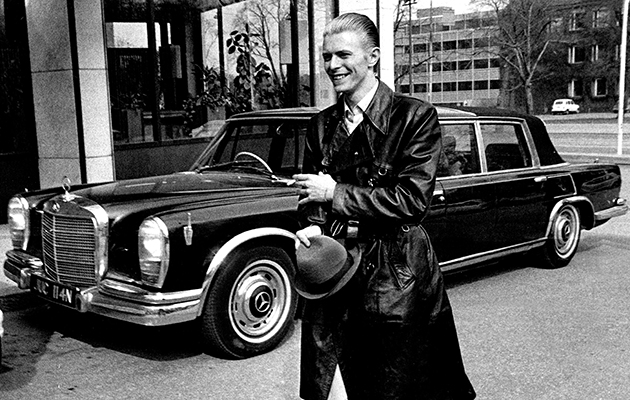Just a stone’s throw from the Eastern Zone, Hansa overlooked the concrete curtain that split Berlin – and the world – in two. According to Visconti, the studio’s location next to a watchtower staffed by gun-toting East German border guards lent the sessions an extra buzz. “Being so close to The Wall made it a pretty exotic place to make a record,” he says. “It was a great moment in a special time. I heard U2 went to Hansa looking for what we’d created there and it didn’t pan out for them. I heard they hated the place.”
Swaggering and anthemic, “Heroes” sounds like Low on steroids. Numb introspection I had evolved into swashbuckling dynamism. Bowie was largely drug-free by now, although by his own admission he was drinking heavily during his first year in Berlin – which perhaps explains the references to booze on “Heroes”. Bowie admits the album’s edge of manic hysteria is not wholly free from the ghosts of Low. “It’s louder and harder and played with more energy,” he concedes. “But lyrically it seems far more psychotic. By now I was living full-time in Berlin so my own mood was good. Buoyant even. But those lyrics come from a nook in the unconscious. Still a lot of house cleaning going on, I feel.”
Embracing everything from Wagnerian electronica to disco romanticism, the vocal tunes on “Heroes” crackle with lusty intensity, while the ambient sound-paintings bathe in Gothic shadows. The foundations for most tracks were laid down in days, prompting a normally painstaking Eno to remark, “Shit, it can’t be this easy.” Bowie favoured one or two takes, with rough and spontaneous edges left in the mix. Visconti recalls Bowie working “unbelievably fast”, with songs like “Joe The Lion” virtually composed as he sang. “I’d put the headphones on, stand at the mic, listen to a verse, jot down keywords that came to mind, then take,” says Bowie. “Then I’d repeat the process for the next section. It was something I learnt from working with Iggy and, I thought, a very effective way of breaking normality in the lyric.”
The symphonic suite of instrumentals which dominates the latter half of “Heroes” was also improvised in the studio, some tracks using Eno’s Oblique Strategies cards. The hilariously grim sturm-und-drang piano piece “Sense Of Doubt” evolved this way, while others were assembled in what Eno calls a “completely arbitrary” manner. “Moss Garden”, a luminous homage to Bowie’s beloved Japan, began with Eno playing a chord sequence and telling Bowie, “Give us a shout when you think it’s long enough.” After a few minutes, Bowie looked at the clock and said, “Yeah, that’ll probably do.” Bosh, bosh, bosh. And it took Radiohead three years to make Kid A. Go figure.
Only one song on “Heroes” was written before recording took place – the achingly romantic alienation ballad “Sons Of The Silent Age”, with its allusions to pre-talkies cinema and ghostly urban dwellers who “glide in and out of life”. Most of Bowie’s lyrics are quick-fire collages or streams of consciousness, written on the hoof. The overblown refrain “Someone fetch a priest!” in “Beauty And The Beast”, for example, is an in-joke adapted from Visconti’s favourite studio exclamation: “someone fuck a priest.” And the shrill, nervous-breakdown screams of “Get me to the doctor!” in “Blackout” are not, Bowie insists, a dramatisation of his own collapse in late 1976, but a reference to power cuts. Either way, he seems to be milking the melodrama for high-camp humour.
Indeed, there’s a rich seam of comedy within “Heroes”, often overlooked. A whiff of self-mockery clings to the alcoholic anti-heroes who populate these tunes, jet black though the joke maybe. David later claimed that he and Eno spent the sessions “laughing and falling on the floor. I think out of all the time we spent recording, 40 minutes out of every hour were spent just crying with laughter.” Eno recently told Uncut that he and Bowie communicated in Peter Cook and Dudley Moore voices throughout the sessions. “Bowie was Pete and I was Dud… It was hilarious, I don’t think I’ve ever laughed so much making a record.”
Bowie now recalls, “We certainly had our share of schoolboy giggling fits. I think ‘most of the sessions’ is a bit of an exaggeration. However, Brian and I did have Pete and Dud down pretty pat. Long dialogues about John Cage performing on a ‘prepared layer’ at the Bricklayer’s Arms on the Old Kent Road and the like. Quite silly.”
But the “Heroes” sessions also involved intense nocturnal marathons, including one which produced the album’s darkest track, “Neuköln” – named after an inner-city area of Berlin where Turkish “guest workers” crowded into brutalist tenement blocks, literally up against The Wall. After these late shifts, Bowie and Eno would stumble back to the Schöneberg apartment, where Eno and his girlfriend were staying.



